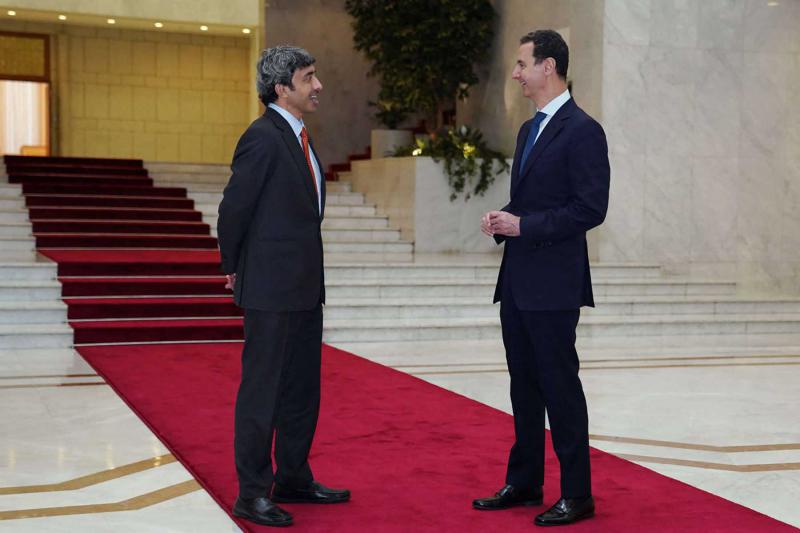احد مبارك مهما كانت الاسباب الكامنة وراء اعلان حزب الله وامل مشاركتهما في جلسات الحكومة ( لاجل اقرار الموازنة فقط! او دون شروط؟ ) فهو موقف مفيد وواجب. اكان السبب هو فقدان نصاب الهيئة العامة لمحكمة التمييز ام الحاجة الى اقرار المساعدات الاجتماعية وبدل النقل للموظفين ام غير ذلك فهو موقف جيد. لكن من المؤكد […]
Doha: A plane from the Amiri Air Force of the Qatari Armed Forces loaded with 70 tons of food, representing a new shipment of food aid provided by the State of Qatar to the army in the sisterly Lebanese Republic of Lebanon, arrived today at Rafic Hariri International Airport. The State of Qatar announced last […]

by reuters — Powerful Lebanese groups Hezbollah and Amal have said they would end a boycott of cabinet sessions, opening the way for ministers to meet after a three-month gap that has seen the economy and currency collapse further. The groups, which back several ministers in a government made up of members from across the political spectrum, said in a statement on Saturday that the decision was driven by a desire to approve the 2022 budget and to discuss an economic recovery. The Lebanese cabinet under Prime Minister Najib Mikati has not met since October 12 due to squabbling about the investigation into the deadly Beirut port explosion in August 2020, and a continuing diplomatic rift with Saudi Arabia and some Gulf states. As a result, the government has been unable to take swift action to address the country’s dire economic crisis.
Since August 2019, the Lebanese pound has lost more than 90 percent of its value as more than three-quarters of the population has slipped into poverty. The country’s inflation rate has exceeded those of crisis-hit Venezuela and Zimbabwe. The World Bank has said the Lebanese financial crisis is one of the worst since the mid-19th century. In December, President Michel Aoun said Lebanon needs “six to seven years” to emerge from the crisis. The economic meltdown began in 2019 when the financial system collapsed under the weight of huge state debt and lack of foreign currency – the result of decades of corruption, economic mismanagement, and unsustainable financing.
تعليق المشاركة في جلسات مجلس الوزراء، حق ديمقراطي مقاطعة جلسات انتخاب رئيس الجمهورية لمدة سنتين ونصف ، ايضاً حق ديمقراطي تعطيل نصاب جلسات مجلس النواب التشريعية هو حق من الحقوق الديمقراطية نظرياً … صح هذه حقوق ديمقراطية عملياً … ديمقراطية بدون ديمقراطيين

Syria’s President Bashar al-Assad (R) talks to UAE Foreign Minister Sheikh Abdullah bin Zayed Al-Nahyan in the capital Damascus, November 9, 2021. (AFP)
by thearabweekly.com — Israel sees benefits in terms of curtailing Iranian influence in Syria arising from the Gulf states’ progress towards normalisation with the Damascus regime, said an Israeli media report quoting “a senior diplomatic official” in the Jewish state. The unnamed source, cited by Israeli news website Ynet, said that closer ties to Arab Sunni states might indicate a willingness on the part of the Syrian regime to curb relations with Iran and Shia allies. “During the coming year there will be opportunities to reduce the Iranian presence in Syria,” predicted the Israeli official. The Israeli source highlighted the importance of the economic factor as the rapprochement between Damascus and Gulf countries could help Syria deal with its financial crunch and shore up the stability of the regime. Syria faces a tough economic crisis due to war-related expenditures and US and European restrictions.
The Israeli official described Iran’s nuclear programme as “a great threat to Israel, even an existential threat” and the development of an atomic weapon by Iran would “exacerbate the terror activities of its proxies in the area.” The source did not rule out an Israeli strike on Iran’s nuclear facilities if the ongoing talks in Vienna do not manage to limit the threat of Israel building a nuclear bomb. But the Israeli official noted that in case of a military attack on Iran, Lebanon’s pro-Iran party Hezbollah and the Palestinian militant faction Hamas might enter the fray in support of Tehran. Hezbollah “has very significant attack capabilities that pose a challenge to us,” the Israeli source added. “We are conducting defensive preparations in the northern arena.” Israeli Prime Minister Naftali Bennett was quoted as telling the Knesset’s Foreign Affairs and Defence Committee, Monday, that Israel was conducting “a multifaceted war” against Iran and its regional proxies, especially Hezbollah and Hamas. He expressed the view that financial constraints and pressures at home limit Iran’s ability to carry out its regional designs. Since last July, a number of Arab countries has increasingly made moves to normalise relations with the Assad regime, through meetings, agreements and economic understandings. The moves involved Jordan, Egypt and the UAE, in particular.
by naharnet –– Democratic Gathering Bloc MP Hadi Abou El-Hassan, said that President Michel Aoun instead of “lecturing” the dialogue boycotters, should have addressed “his ally,” which is “the main party disrupting the country.” He added that “the one who had disrupted the country for 9 years out of his 16 years of management, shouldn’t […]
by reuters — BEIRUT: Lebanon’s central bank said on Friday it aimed to boost the Lebanese pound’s value by easing restrictions on dollar purchases after the currency hit a record low, fueling fresh protests about rising prices and a collapsing economy. The pound, which has lost more than 90 percent of its value since Lebanon’s […]
Citations: “La guerre ! c’est une chose trop grave pour la confier à des militaires” ( Georges Clémenceau ) “La politique est une chose trop sérieuse pour la confier aux politiciens” ( Charles de Gaulles ) “Le dialogue est une chose trop sensible pour le confier uniquement aux partis politiques” ( un citoyen libanais )

BEIRUT (Reuters), – The governor of the central bank in Lebanon said Thursday that a judge who was leading one of his investigations into him was biased. She had imposed a travel ban against him earlier this week. Riad Salmeh has denied any wrongdoing in his nearly three-decade tenure as the head of the central bank. He is currently being investigated in Lebanon and at most four European countries. This investigation comes after he was implicated in the 2019 economic crash in Lebanon. On Thursday, Judge Ghada Aoun (who is leading one of the Lebanese probes) imposed a travel ban for Salameh. According to a source, her probe covered fraud and abuse of public money. Salameh stated in a statement that he has shown respect to the judiciary through his appearances before judges. He also said that the purpose of the lawsuits against Salameh was to “distort” my image, both before the public and overseas.
Salameh who is supported by several politicians said Aoun used her private Twitter account (NYSE;) in a “hostile fashion” against him. He also criticised other aspects. of the investigation. According to simple legal rules it’s impossible for a judge and an arbiter to act at the same moment,” he stated in the statement, in which he claimed he submitted a request to remove Aoun from the case. Aoun has not yet responded to my request for comment.

By Najia Houssari — arabnews.com — BEIRUT: Lebanon’s public transport drivers blocked roads on Thursday, paralyzing traffic throughout the country in protest against the manipulation of exchange rates that has left them out of pocket. A driver in downtown Beirut said: “We can barely afford hospitalization or medicine. We are begging healthcare associations for our rights that the state is supposed to secure for us.” Banks did not open on Thursday, as employees were unable to get to work, while schools and universities were also closed. In less than a year since the removal of subsidies, the price of a 20-liter canister of gasoline has increased tenfold to almost 400,000 Lebanese pounds ($264), while the minimum monthly wage of 675,000 pounds has remained unchanged.
Fadi Abou Shakra, a representative of Lebanon’s fuel distributors who took part in the protests, said: “Our issue with the state is the rise in the exchange rate. Officials did nothing to control the illegal platforms manipulating the exchange rate. It is not our hobby to block roads and create problems. Today is a day of anger and we’ll see what next week brings.” Soldiers and other security forces were deployed to control the situation after disputes broke out between protesters and members of the public trying to use the blocked roads. The protesters were supported by the head of the General Labor Union, Bechara Al-Asmar, who said the action was “a cry for officials to perform their role and duties toward the people.”



